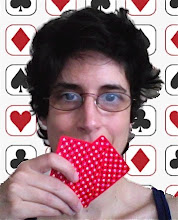Attitude
The more I play poker, the more convinced I become that the single biggest component of a winning edge is the player's attitude.
As with any craft or art, one must have mastered the basics. You've got to know the math (to a reasonable approximation, anyway). You have to be in good-enough health to think clearly, observe, remember, concentrate, and put in a sustained effort. You have to be sufficiently experienced to recognize the shape of certain situations and their likely significance. And, of course, when you get to showdown you have to actually have the winning cards often enough.
But the fact is, all of the above is useless ~ as a practical matter ~ without the right attitude. Although elements of the right attitude change with the circumstances, there are some things about it that can be asserted independently. The right attitude is: even-tempered, open, unafraid, patient, focused, flexible, imaginative, rational, creative, self-aware, and resilient.
Aren't these qualities highly desirable in life as well? (Of course, one might also add to the list: ruthless and relentless. Compassion and mercy do not enter the equation at the poker table; whereas, a life devoid of these essential qualities of humanity is hardly worth living.)
I watch with astonishment as decent players fall apart because their attitude is incompatible with success. They are so highly reactive, so emotionally labile (to get technical about it), that a bad card or an insult or the wrong music or indigestion or too much to drink or whatever disagreeable internal or external factor can move them off their best game. They wobble into disequilibrium, they tilt, and then with the slightest nudge they fall.
People often think that I am tilted when I'm not. Some of that is deliberate. I will feign being upset, so as to lead opponents into believing I am steamed and making unwise decisions based on my emotional state. This is often very successful, I think, because many of my competitors really do steam at length and so it's easy for them to impute that frame of mind to me, too.
Sometimes, though, in a friendly game among people whom I know well, I will repeatedly return to discussing a hand in which I was beaten. The other players think I'm obsessing over the hand unhealthily as I revisit every nuance of the play. But that's not it at all: I'm trying to extract the maximum learning out of the experience. I revisit every step of the action, every inflection point, and try to elicit "what-if's" from both myself and the other participants in the hand and observers at the table. They think, "She can't let the hand go." I think: "I'm not letting go of this hand until I understand everything I possibly can about what happened."
There is rarely one and only one correct play in interesting hands (this is, come to think of it, probably the first point in the definition of "interesting hand"). Furthermore, I am not satisfied with my game. Far from it! I try to squeeze every ounce of information out of a failure, so that I can strive to not make the same mistake ~ or the same kind of mistake ~ again (or often, anyway).
My motto as an apprentice in the land of professional poker: Always Be Learning.
Labels: tilt

3 Comments:
Proper attitude is the thread that holds the other attributes together. Without it, you come apart at the seams.
I would add "perspective" as a critical portion of the attitude though. Keeping everything together emotionally becomes a non-issue for me if I maintain a proper perspective on why I am sitting at the poker table... To play poker correctly with an absolute certainty that financial gain will result in the long term.
Good post. Another part of attitude is confidence. It seems to me that players who are confident get better results, sort of self-fulfilling prophecy or something. Why this is would be a good dissertation topic for somebody.
I'm not sure I agree about about confidence, Mojo. I think equanimity is more valuable than confidence.
Most poker-players I know tend to either over- or underestimate their own skills by a meaningful margin. They tend to think they are either much further ahead or much further behind in a hand than they really are.
Sandman may be getting at something when he proposes "perspective." I might call it a sense of proportion.
Post a Comment
Subscribe to Post Comments [Atom]
<< Home